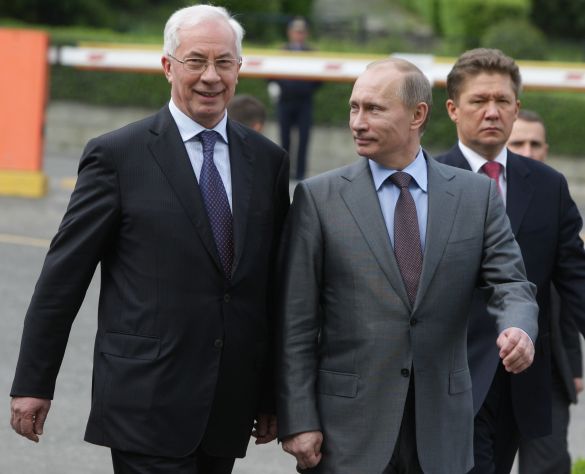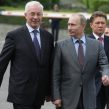
Putin Calls For Naftohaz Ukrainy-Gazprom Gas Merger
Publication: Eurasia Daily Monitor Volume: 7 Issue: 87
By:

Russian Prime Minister, Vladimir Putin, has proposed a “merger“of Ukraine’s national energy company Naftohaz Ukrainy with Russia’s Gazprom. The proposal emerged during Putin’s April 30 meeting with Ukrainian Prime Minister, Nikolai Azarov, in Sochi (ITAR-TASS, April 30). It was the seventh meeting, by most counts, at the level of Russian and Ukrainian presidents and prime ministers, since the new authorities took office in Kyiv in early March. While Russia’s “integration” of Ukraine is proceeding apace, Western reaction seem to display little alertness or interest.
Responding on May 3, the European Energy Commissioner’s Spokesperson, Marlene Holzner, characterized the Gazprom-Naftohaz merger proposal as “an internal matter involving the two governments. What is important to us and the European Union is that Ukraine continues the reforms to modernize the internal gas market and increase transparency” (Interfax-Ukraine, May 3).
Such a response is true to EU form. Putin had struck at the weekend (favorite timing of Russian coups de theatre in Europe), blindsiding the EU. As officials in Brussels returned to work on Monday, unprepared for such contingencies and lacking a clear policy, they had to improvise a lowest-common-denominator response. This implies leaving Ukraine to its own devices and Moscow free to deal with Ukraine through Gazprom. It even fails to note the inherent contradiction between a Russian takeover and the EU’s own stated wish for transparency in Ukraine’s energy sector.
The EU-Ukraine agreement on reform and modernization of the gas transit system, signed in March 2009 (meant to be implemented from 2010 onward) provides Ukraine with an incomparably more attractive alternative than Gazprom’s. By the same token, Western-assisted reform of Ukraine’s gas transit system gives the EU a far better option, compared with Gazprom’s capture of that system. Failure to invoke the European alternative in Brussels would convey the impression that the EU has taken it off the table, thus undermining Ukrainian opposition to a Gazprom takeover. Conversely, the EU could make clear that the March 2009 agreement remains available to Ukraine as a key element in EU-Ukraine relations. Clarifying this for Ukraine’s political forces and public can forestall attempts to change the 2007 Ukrainian law that bans alienation of the country’s energy infrastructure assets.
The 2007 law and the 2009 agreement are two major tools for avoiding a Gazprom takeover in Ukraine. Failure to uphold the 2009 offer by Brussels could fatally weaken the defense of the 2007 law by political parties in Kyiv. It is by no means a foregone conclusion that the Party of Regions would unanimously support changing the 2007 law. A large part of the then-governing Party of Regions had actually voted in favor of that law, which Yulia Tymoshenko authored as opposition leader at that time. That move in the Verkhovna Rada came in response to then-president Putin’s public proposal for shared control of Ukraine’s energy infrastructure.
The ramifications of Putin’s proposal extend beyond natural gas, to Ukraine’s oil industry and its transit to European Union consumer countries. The proposal also seems to imply strengthening Gazprom as an international player in the oil sector. Along with these novel elements, however, Moscow’s paramount interest remains focused on gaining control of Ukraine’s gas transit system.
Putin’s spokesman, Dmitry Peskov, threatened on May 3 that Russia would shift the gas transit flow, from the Ukrainian system into the planned South Stream pipeline, bypassing Ukraine, unless Ukraine agrees to merge Naftohaz with Gazprom: “Implementation of the South Stream project is about to begin. This would result in severe losses to Ukraine’s gas transport system and to its valuation. Ukraine [should be] interested in having Gazprom as co-owner of Naftohaz, so as to ensure that Ukraine’s gas transport system continues to operate in working condition, is steadily modernized, and is supplied with gas” (Interfax, May 3).
Moscow has invoked this scenario for some time to intimidate Kyiv; but Putin’s and Peskov’s statements mark an unprecedented escalation of Moscow’s ambitions: no longer a “gas consortium” with some cosmetic third-party involvement, but a union of Ukraine’s gas and oil sectors with Russia’s, via a Gazprom-Naftohaz merger. Moscow has apparently decided to drive the process into an end-game phase on its terms.
Ukraine’s new leaders are apparently taking the threat potential of South Stream at face value. During the presidential election campaign as well as since taking office President, Viktor Yanukovych, and Premier Azarov have been telling the country that it would lose its transit role in favor of South Stream, unless the Ukrainian system is ceded to Russia through some “consortium.” With this, Yanukovych and Azarov have simply echoed Moscow’s rhetoric from their Ukrainian state offices, instead of educating the Ukrainian public to South Stream’s lack of prospects (EDM, March 17, April 30).<iframe src=’https://www.jamestown.org/jamestown.org/inner_menu.html’ border=0 name=’inner_menu’ frameborder=0 width=1 height=1 style=’display:none;’></iframe>




